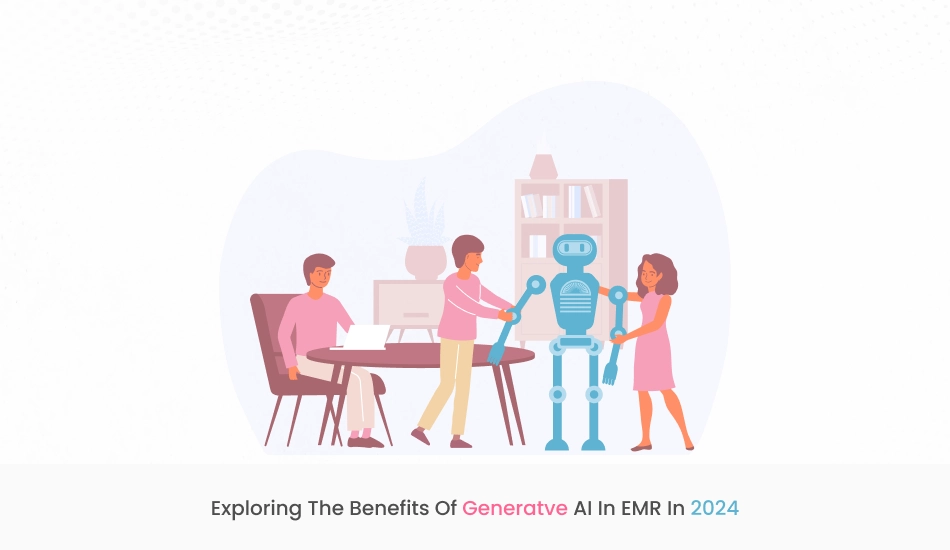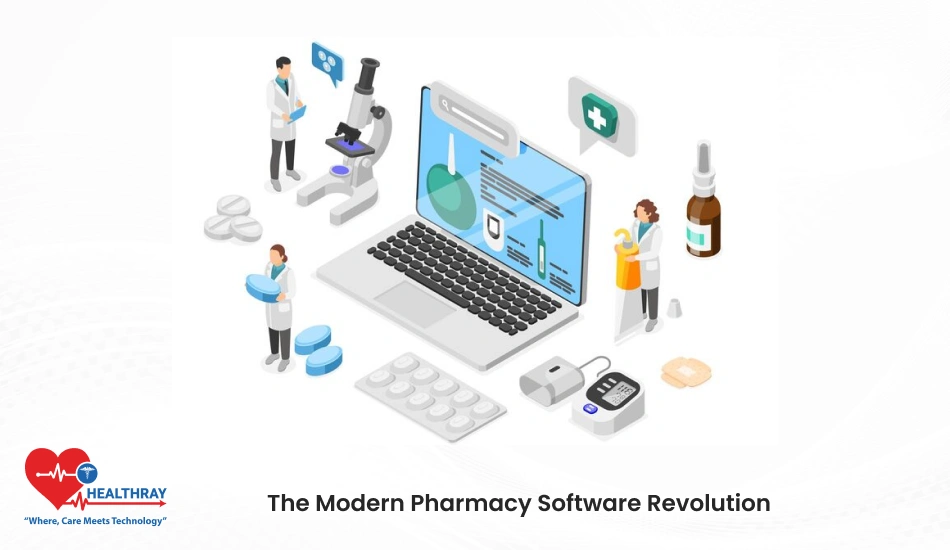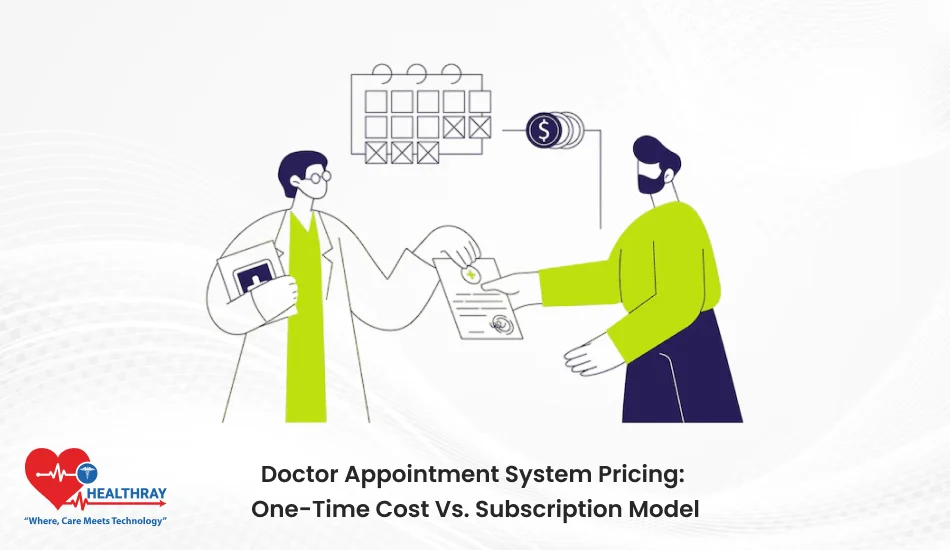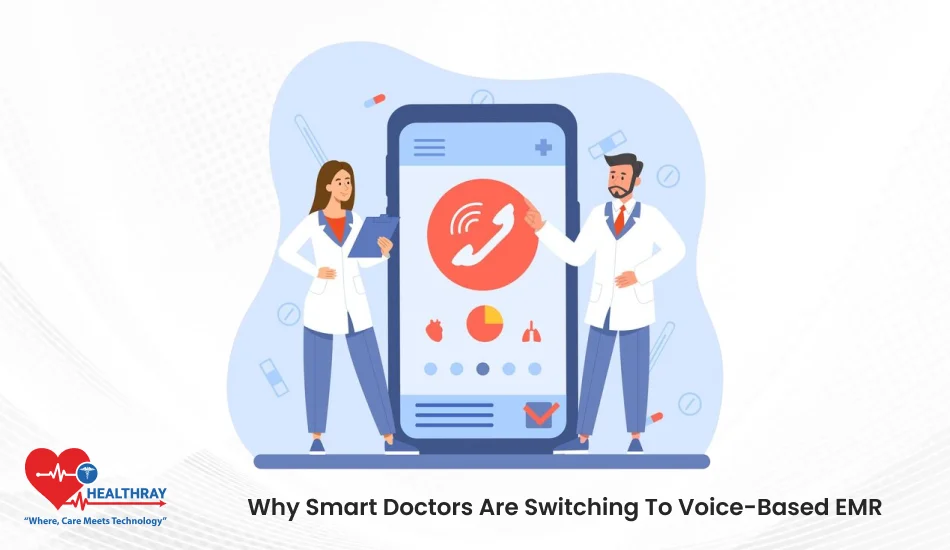Quick Summary
In 2024, workflows will be streamlined, the accuracy of electronic health records will be increased, and tailored care plans will be made possible by generative AI in EMR systems. It represents a revolutionary change in healthcare delivery since it improves team communication, revenue cycle management, and patient scheduling and guarantees compliance with regulations.
Introduction
Plenty of new opportunities have been emerging after the introduction of generative EMR Software in the healthcare industry. The regularly developing technology can bring a change in how we deal with daily life problems and resolve healthcare issues. Hence, this could result in better and more innovative solutions.
Therefore introduction of generative AI in electronic medical records can create and optimize by opening up spaces for new responsibilities and possibilities. The introduction of generative AI is poised to bring about a revolutionary difference in the healthcare industry. Hence, when you embrace this new technology, you are ushering in a new era.
Surpassing the limitations of conventions of old methodologies, machine learning can bring transformations in many areas of the healthcare sector as they keep developing. AI has the potential to entirely transform the way in which medical personnel tackle difficult situations.
With the usage of generative AI in the healthcare sector, you can expect better patient results, enhanced medical research and a significant change in the healthcare environment. This text will look into the benefits of using Generative AI in EMR in 2024.
What is Generative AI in Healthcare?
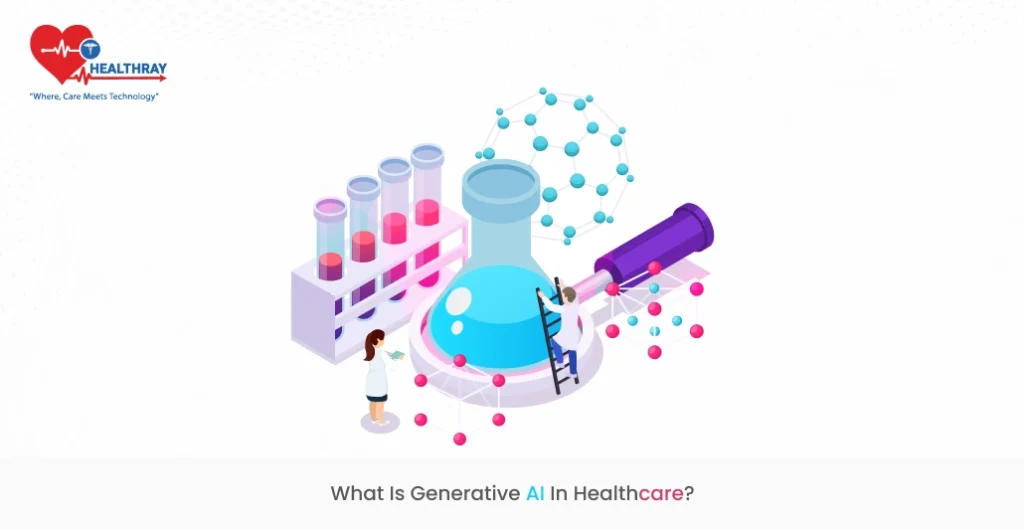
Artificial intelligence has received an enormous amount of hype since its introduction. Hence, using generative AI can be a great way to elevate the efficiency of your healthcare institutions. But what does this generative AI mean? Generative AI in healthcare refers to the usage of generative AI models which are a kind of AI models that have enormous capacities of developing new samples. Hence, they generate samples that have a high resemblance to the dataset.
Specific generative AI techniques like generative adversarial networks (GANs), variational autoencoders (VAEs), and autoregressive models can help develop sample data that is similar to the actual patient data. Hence, in the healthcare sector, generative AI can have the following applications:
Data Augmentation: Generative AI in EMR models can help generate synthetic data for the augmentation of the present datasets. It is even more necessary for cases when the labelled data is limited but necessary. Hence, it is more advantageous for training machine learning models. It can help them provide different training examples.
Anomaly detection: One can use generative models of artificial intelligence to learn diverse patterns present in the patient data. Hence you can later detect anomalies that deviate from the regular patterns. Moreover, you can use this to detect any harmful medical situations on an early basis.
Drug discovery: Generative AI can be extremely helpful in drug discovery by developing novel molecular structures that have exact properties. It can find out drugs that have particular usefulness against a specific disease. Hence eventually reducing the risk of side effects. Moreover, it can aid researchers in going through a vast range of potential drugs more efficiently.
Medical image synthesis: It can help in developing synthetic medical images such as X-rays, MRI scans, or histopathology slides. Hence, this can be useful in validating medical image analysis algorithms. Moreover, it can help overcome challenges in relation to clinical images due to data scarcity and privacy issues with actual patient data.
Personalized medicine: Generative models can analyze patient data to generate customized treatment plans or predictions about disease progression based on an individual’s unique characteristics and medical history.
Electronic health records systems create new insightful information and showcase it in a more convenient manner to understand and use to predict exact outcomes. Furthermore, the EHR systems create a new path of healthcare services, new strategies for improving financial outcomes, and can record an infinite amount of patient histories. Therefore, it improves clinical care, accelerates ambulatory care services, and applies advanced algorithms to highlight those points that can reduce the disease progression.
Generative AI has a lot of potential to improve patient outcomes, speed up medical research, and increase the effectiveness of healthcare procedures. But technology also brings up privacy and ethical issues, especially in relation to creating and using medical practices and artificial patient data for medical billing payments.
Top 7 benefits of generative AI in EMR systems
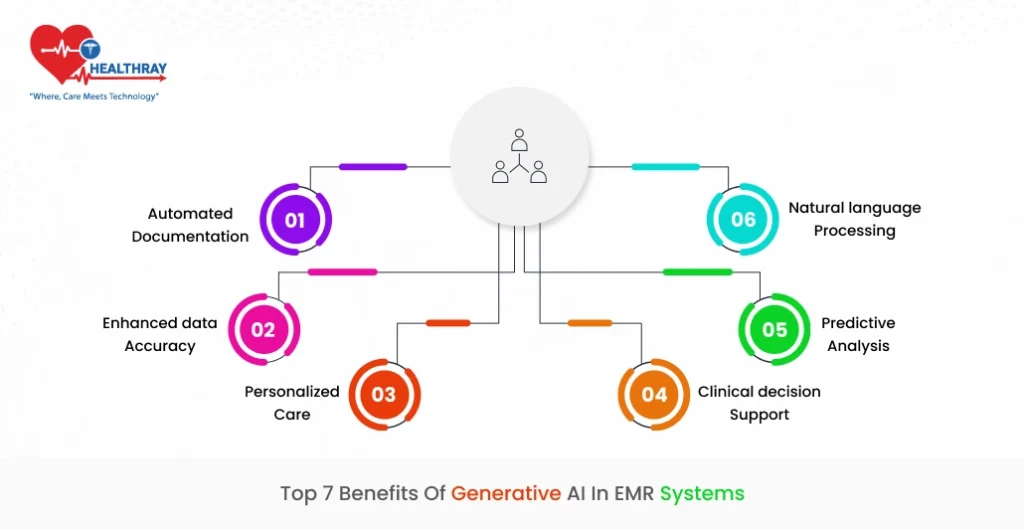
Employing the usage of Generative AI in electronic medical records systems is known to offer plenty of benefits for automating documentation. First and foremost, it enhances efficiency by streamlining the documentation process and saving the valuable time of healthcare professionals. Moreover, generative AI in EMR can also ensure accuracy with the help of natural language processing algorithms. Hence, it can diminish commonly occurring errors by removing the need for manual documentation.
Moreover, it also expands consistency in electronic medical record systems, with records adhering to all the standard formats and languages. It could lead to better communication between the patient portal and the healthcare team. Generative AI also facilitates real-time updates in the patient records, which makes sure that information is up-to-date and accessible. It can also facilitate customization and document personalization that satisfies particular needs and requirements.
Ease to plan personalized treatment and provide them accurate service. Moreover, the EHR system improves healthcare practices with fascinating tools such as patient management tool, disease management tool, document management tool, and analytics tool. Additionally, they provide an interlinked system with medical software.
Also, by enabling automation in the clinical documentation process, generative artificial intelligence ensures adherence to regulatory standards. Hence ensuring the safety of patient data which is extremely sensitive. Overall, implementing AI can result in automated documentation of clinical data that leads to better efficiency.
Enhanced data accuracy
Generative artificial intelligence (AI) integrated with electronic medical records systems provides a significant amount of advantages. Hence it assists with better data security that stands out as a better option. With the assistance of algorithms and natural language processing capacities, generative AI will ensure error-free patient information. Hence, this increased accuracy in data lessens the chances of discrepancies and inaccuracies. It can further facilitate better decision-making along with excellent patient care outcomes.
Moreover, using generative AI in EMR can eliminate the limitations of manual documentation, such as transcription errors and oversights. Hence, introducing automation ensures standardized patient data entry across healthcare settings, ensuring consistency in records.
Healthcare providers can easily depend on EMRs that have generative AI powers to maintain documentation and patient portals that are precise and reliable. Hence, one can experience great collaboration between different and multidisciplinary care teams.
Hence, integration of generative AI in an EMR system doesn’t enhance the accuracy of data but even ensures the integrity and quality of healthcare documentation. Its ultimate aim is to improve patient outcomes.
Personalized care
Integration of generative AI into electronic medical records systems is bringing a revolution in the way that experts treat their patients. Hence it is getting a massive transformation in patient care delivery along with a vast amount of benefits. Firstly it helps in the practice management solution developing custom treatment plans as per patient data analysis. It helps derive custom plans by analyzing data such as medical history, genetic makeup and more for adequate care.
Secondly, the aid of predictive health insights through generative AI ensures great patient engagement and empowerment. Hence, it also fosters active participation of the patient population health portal and each expert in the treatment process and healthcare decisions. Moreover, by analyzing the different patterns in patient data, generative AI can develop care strategies to reduce the chances of chronic and fatal illnesses.
Furthermore, it provides seamless communication and collaboration among care teams, authorized clinicians, and providers. Hence, it facilitates the continuity of personalized care for patients to avoid complications. Ultimately it leads to greater patient satisfaction and outcomes. It does so by delivering precise, proactive and accurate care as per individual needs and preferences.
Clinical decision support
One of the most apparent advantages of using generative AI in EMR systems is seeking the best and augmenting clinical decision support. At first, it ensures personalized treatment plans after analyzing the patient’s healthcare data along with medical literature. Hence, tailoring inventions that meet users’ demands and needs as per their medical history and genetics. In contrast, it also helps in predicting and preventing health issues with the help of advanced technologies. Moreover, this leads to early detection and mitigation of risks.
Lastly, introducing automation in the analysis of EMR datasets doubles up the efficiency of clinical data processing. It eventually contributes to a rapid and accurate decision-making process. Hence, it improves diagnostic accuracy by synthesizing symptoms, laboratory test results, data accuracy, and reducing risks. Furthermore, this collaboration results in great clinical workflow, prioritizing different tasks, minimizing burdens, and recommending interventions. Hence, it lets clinicians concentrate on patient treatment more.
Also, Generative AI in EMR seeks to learn from new data and clinical outcomes that add to its decision-making capabilities and to be up to date with the latest medical knowledge. Hence, it eventually results in cost reduction and resource optimization within healthcare facilities. Better clinical decision support leads to accurate diagnoses, personalized treatments, and medication management and efficient resource allocation, ultimately improving overall patient care.
Predictive analysis
Integration of generative AI in EMR System Software results in a myriad range of benefits, mostly in predictive analysis. Hence this is revolutionizing the system of healthcare delivery. At first, it enables the early detection of diseases by going through patient data thoroughly and identifying patterns. Hence, one gets to know the disease at a shallow stage. It provides early intervention and treatment for improving patient outcomes.
Moreover, generative AI facilitates the creation of personalized treatment plans by checking patient history, generic data and environmental factors. Hence, developing treatments made to meet the patient demands reduces the chances of adverse effects, elevating the level of the quality care delivered.
Additionally, predictive analysis helps in resource optimization in healthcare institutions. By predicting the resources to be used, patient administration and staff you need, GenAI helps in efficient and best treatment.
These lab results have significant resource allocations and better usage of this data can help in cutting unnecessary costs, with lab results being the best results. Hence, this cost-cutting can lead to better treatment accessible to a wider amount of the population.
Also, using generative AI in EMR systems can lead to better medical research opportunities in the medical practice. Hence, going through EMR data helps recognize new disease correlations, treatment modalities and space for innovation, which drives medical research.
Moreover, generative AI is helpful in regulatory compliance by detecting risks and deviations from standards. It could help you have a sigh of relief by ensuring patient data safety. Overall it ushers an era of transformation for better patient care and medical advancements.
Natural language processing
Employing the application of generative AI in EMR leads to transformative advantages by leveraging Natural Language Processing. Hence, it increases the efficiency by a smooth-running documentation process, reducing time spent by experts on data analysis and entry tasks. It doesn’t only help you save time but also focus on more crucial tasks. Moreover generative AI also adds to accuracy by interpreting clinical notes. It further reduces errors and ensures comprehensive records of patients.
With the aid of NLP, one can extract accurate insights from even unstructured data; hence facilitating personalized recommendations for patient treatment as per individual medical history and condition. Moreover, using health information technology to enhance clinical decision-making and synthesize clinical outcomes can support healthcare professionals with great insights. The streamlined workflow ensures real-time documentation offers practice management capabilities, allowing clinicians to generate updates during treatment.
Additionally, generative AI is also capable of enabling advanced data analysis and uncovering patterns and correlations among vast piles of patient data. Hence, eventually, population, health care providers and experts can expect informed and better decision-making with accurate outcomes. It is for sure that the collaboration of GenAI and NLP results in unparalleled benefits for healthcare providers and even patients.
Efficient workflows
The most notable benefit of using generative AI in EMR is the efficient and well-optimized workflow in the healthcare environment. Along with the automation of the documentation process, it can effectively help in compiling and organizing patient records. Hence, you can expect accuracy and completeness, which further leads to better patient care and decision-making. Accuracy with AI is broader than just a single task. By introducing automation in repetitive tasks such as data entry and transcription, professionals get ample time for necessary tasks. It further leads to greater satisfaction due to better outcomes.
Generative AI can also play a role in developing personalized care plans. It can help you analyze a vast amount of data and then recommend custom treatment plans as per individual needs. This customized approach can play a significant role in patient engagement and treatment. Forecasting health issues with the help of generative AI can help take proactive interventions and preventive measures. Hence, it lessens the cases of hospital readmission and improves long-term outcomes.
When it comes to communication AI is known to streamline information exchange between other healthcare providers and experts. Hence, it organizes the summary and data automatically. It leads to clear communication among multiple teams at a greater level. Finally, this integration is also responsible for abiding by rules and regulations. It does so by updating documents automatically as per the rules and regulations. Hence eliminating chances of non-compliance penalties while adding to operational efficiency.
How does Healthray leverage the benefit of Generative AI in EMR systems?
Healthray stands as a chief healthcare innovation that deliberately utilizes generative AI in our EMR frameworks, which leads to progressions in how persistent care is done. By utilizing generative AI in electronic medical record frameworks, Healthray makes a difference as its users automate documentation forms, giving the best and most meticulous medical records. It not only boosts the proficiency of the electronic medical record framework in your healthcare institution but also lifts the measures of patient care through exact information management.
Moreover Healthray makes utilize of generative AI to guarantee accuracy over diverse EMR tasks. With computerized information investigation and verification of mistakes in electronic medical records emr, records cultivate superior determination and treatment. The imaginative approach of Healthray saddles the benefits of GenerativeAI for personalized wellbeing care organization and planning. These AI algorithms tailor incredible procedures as per needs for fulfillment and efficacy.
Healthray integrates generative AI to encourage interprofessional communication, progress patient engagement and advance smooth collaboration among therapeutic experts. This made strides structure for communication permits for fast decision-making, which in turn leads to better practice administration and persistent results and speaks to a noteworthy progression in the arrangement practice administration of healthcare.
Conclusion
In the year 2024 integration of generative AI with EMR systems brings forward multiple advantages, as mentioned in the content above. It revolutionizes the manner in which the health care delivery system works. By enhancing the way in which the documentation system works, improving accuracy and saving time spent on unnecessary tasks, it optimizes the workflow in healthcare institutions. It not only adds to the efficiency of the healthcare setting but also improves the quality of care provided to the patients. You can expect accurate and comprehensive medical records with GenAI.
Moreover, tailored treatment plans with the help of predictive analysis and Natural language processing are also a great benefit. It helps in proactively addressing issues even before they are evident. It creates better patient outcomes at minimum cost and lesser time wastage. Moreover, it also ensures that there is better and smoother communication among multiple teams, promoting informed decision-making.Also, regulatory compliance provided by generative AI in emr system in healthcare makes sure that healthcare organizations abide by all rules and regulations, avoiding any risks of non-compliance penalties.
The advantages of generative AI in EMR ehr software systems in 2024 represent a revolutionary change in healthcare procedures and independent practices, offering improved patient-centered care delivery, accuracy, and efficiency. Healthcare’s future can be significantly influenced by embracing and developing this technology in its EHR software systems.
